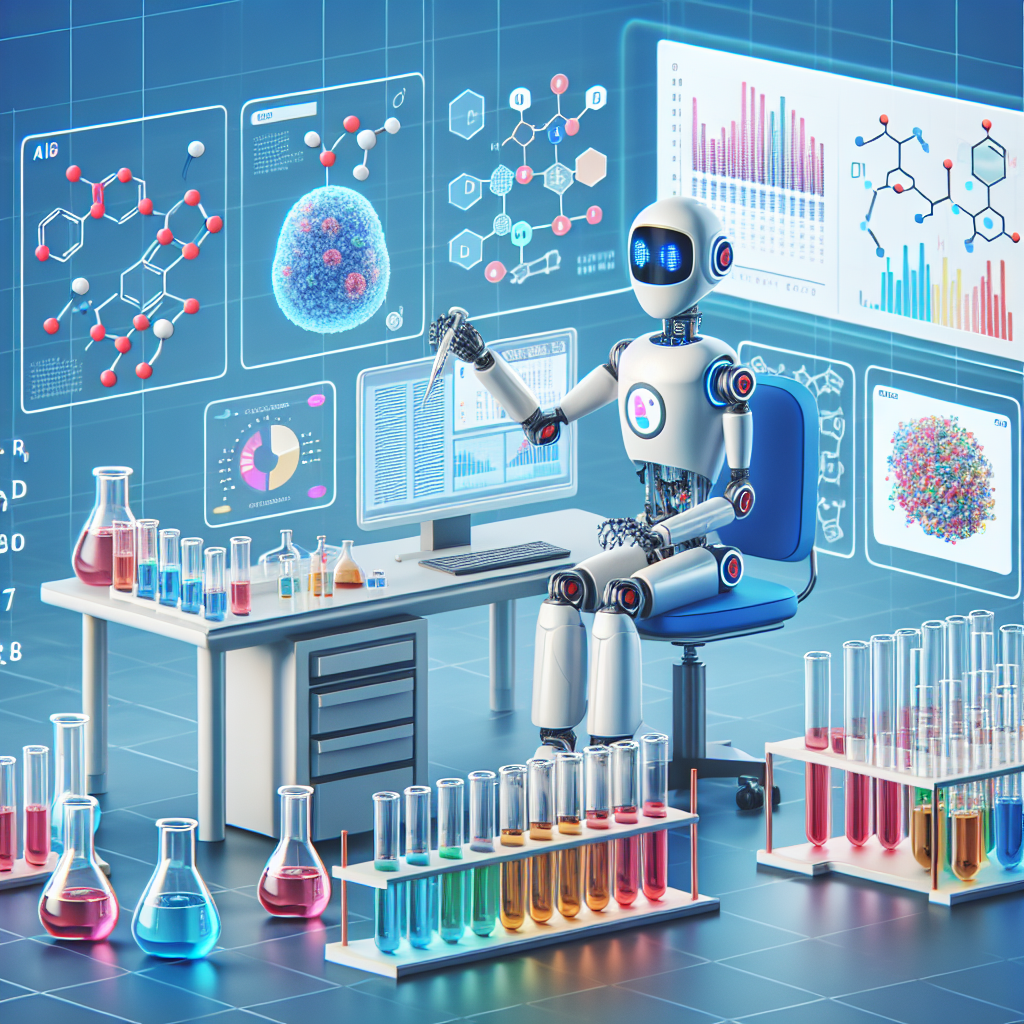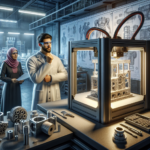-
Table of Contents
“Revolutionizing Medicine: AI Accelerates Drug Discovery for Faster, Safer Treatments”
Introduction

Artificial Intelligence (AI) is revolutionizing the drug discovery process by significantly enhancing the efficiency, accuracy, and speed of identifying potential therapeutic compounds. Traditionally, drug discovery has been a time-consuming and costly endeavor, often taking over a decade and billions of dollars to bring a new drug to market. AI technologies, including machine learning algorithms, natural language processing, and predictive analytics, are transforming this landscape by enabling researchers to analyze vast datasets, predict molecular behavior, and identify promising drug candidates with unprecedented precision. By automating routine tasks, uncovering hidden patterns in biological data, and simulating complex biological interactions, AI is not only accelerating the discovery of new drugs but also reducing the associated costs and risks. This integration of AI into drug discovery is paving the way for more personalized and effective treatments, ultimately improving patient outcomes and advancing the field of medicine.
Accelerating Drug Discovery Timelines with AI
The world of drug discovery has always been a complex and time-consuming endeavor, often taking years, if not decades, to bring a new drug from the initial concept to the market. However, recent advancements in artificial intelligence (AI) are revolutionizing this process, significantly accelerating drug discovery timelines and offering new hope for patients worldwide. By leveraging the power of AI, researchers and pharmaceutical companies are now able to streamline various stages of drug development, from initial research to clinical trials, in ways that were previously unimaginable.
One of the most significant ways AI is transforming drug discovery is through its ability to analyze vast amounts of data at unprecedented speeds. Traditional methods of drug discovery often involve laborious and time-intensive processes, such as manually sifting through scientific literature, conducting numerous experiments, and analyzing complex biological data. AI, on the other hand, can quickly process and interpret large datasets, identifying potential drug candidates and predicting their efficacy with remarkable accuracy. This not only saves valuable time but also reduces the likelihood of human error, leading to more reliable results.
Moreover, AI-driven algorithms are capable of identifying patterns and correlations that might be overlooked by human researchers. For instance, machine learning models can analyze genetic data to uncover new drug targets, predict how different compounds will interact with these targets, and even suggest modifications to improve a drug’s effectiveness. This level of precision and insight is particularly valuable in the early stages of drug discovery, where identifying the right target and optimizing lead compounds can make or break a project.
In addition to speeding up the initial stages of drug discovery, AI is also making a significant impact on the preclinical and clinical trial phases. Traditionally, these stages involve extensive testing on animal models and human subjects, which can be both time-consuming and costly. AI can help streamline these processes by simulating how a drug will behave in the human body, predicting potential side effects, and identifying the most promising candidates for further testing. This not only accelerates the timeline but also reduces the need for extensive animal testing, addressing ethical concerns and improving the overall efficiency of the drug development process.
Furthermore, AI is playing a crucial role in personalized medicine, which aims to tailor treatments to individual patients based on their unique genetic makeup and medical history. By analyzing patient data, AI can help identify which patients are most likely to benefit from a particular drug, thereby improving the success rates of clinical trials and ensuring that new treatments are more effective and safer for those who need them most. This personalized approach not only enhances patient outcomes but also reduces the time and resources required to bring a new drug to market.
As AI continues to evolve, its potential to transform drug discovery processes will only grow. The integration of AI with other cutting-edge technologies, such as genomics, proteomics, and high-throughput screening, promises to further accelerate the pace of innovation in the pharmaceutical industry. While challenges remain, including the need for robust data privacy measures and the development of standardized protocols for AI implementation, the benefits of AI in drug discovery are undeniable.
In conclusion, AI is revolutionizing the drug discovery landscape by significantly accelerating timelines, improving accuracy, and enabling more personalized approaches to treatment. As researchers and pharmaceutical companies continue to harness the power of AI, the future of drug discovery looks brighter than ever, offering new hope for patients and paving the way for a new era of medical innovation.
Enhancing Predictive Accuracy in Drug Development Using AI
Artificial intelligence (AI) is revolutionizing various industries, and the field of drug discovery is no exception. Traditionally, drug development has been a lengthy, costly, and complex process, often taking over a decade and billions of dollars to bring a new drug to market. However, AI is now enhancing predictive accuracy in drug development, offering promising solutions to streamline this intricate process.
One of the most significant ways AI is improving drug discovery is through its ability to analyze vast amounts of data quickly and accurately. In the early stages of drug development, researchers must sift through enormous datasets to identify potential drug candidates. AI algorithms can process this data at a speed and scale that is impossible for humans, identifying patterns and correlations that might otherwise go unnoticed. This capability not only accelerates the initial stages of drug discovery but also increases the likelihood of identifying viable drug candidates.
Moreover, AI’s predictive power extends to the modeling of drug interactions within the human body. Traditional methods often rely on trial and error, which can be both time-consuming and costly. In contrast, AI can simulate how a drug will interact with various biological systems, predicting potential side effects and efficacy with remarkable accuracy. This predictive modeling helps researchers refine drug candidates earlier in the development process, reducing the risk of costly failures in later stages.
Transitioning from data analysis to practical application, AI is also enhancing the design of clinical trials. By analyzing patient data, AI can identify suitable candidates for clinical trials more efficiently, ensuring a more targeted and effective study. This targeted approach not only improves the chances of a successful trial but also reduces the time and resources required. Additionally, AI can monitor ongoing trials in real-time, providing valuable insights that can be used to adjust protocols and improve outcomes.
Furthermore, AI’s role in drug repurposing is gaining traction. Drug repurposing involves finding new therapeutic uses for existing drugs, a process that can be significantly expedited by AI. By analyzing existing drug data and identifying new potential applications, AI can help bring treatments to market more quickly and at a lower cost. This approach is particularly valuable in addressing urgent health crises, such as the COVID-19 pandemic, where time is of the essence.
In addition to these practical applications, AI is fostering greater collaboration within the scientific community. By providing a common platform for data sharing and analysis, AI enables researchers from different disciplines and institutions to work together more effectively. This collaborative approach not only accelerates the drug discovery process but also fosters innovation and the development of new methodologies.
Despite these advancements, it is important to acknowledge the challenges and limitations of AI in drug discovery. Ensuring the quality and accuracy of the data used by AI algorithms is crucial, as poor-quality data can lead to inaccurate predictions. Additionally, the integration of AI into existing workflows requires significant investment in technology and training. However, as AI continues to evolve and improve, these challenges are likely to diminish, paving the way for even greater advancements in drug discovery.
In conclusion, AI is playing a transformative role in enhancing predictive accuracy in drug development. From data analysis and predictive modeling to clinical trial design and drug repurposing, AI is streamlining the drug discovery process and increasing the likelihood of success. As the technology continues to advance, the potential for AI to revolutionize drug discovery and improve patient outcomes is immense, offering a glimpse into a future where new treatments are developed more efficiently and effectively than ever before.
AI-Driven Personalization in Drug Discovery and Development
Artificial intelligence (AI) is revolutionizing various industries, and the field of drug discovery and development is no exception. One of the most promising advancements is AI-driven personalization, which tailors drug discovery processes to individual patient needs. This approach not only accelerates the development of new medications but also enhances their efficacy and safety.
To begin with, traditional drug discovery methods are often time-consuming and costly, involving years of research and billions of dollars. However, AI has the potential to streamline these processes significantly. By analyzing vast amounts of data, AI algorithms can identify potential drug candidates much faster than human researchers. This capability is particularly beneficial in the early stages of drug discovery, where identifying promising compounds can be akin to finding a needle in a haystack.
Moreover, AI-driven personalization allows for a more targeted approach to drug development. Instead of adopting a one-size-fits-all strategy, AI can analyze genetic, environmental, and lifestyle factors to predict how different patients will respond to a particular drug. This level of personalization is crucial for developing treatments for complex diseases like cancer, where individual responses to therapy can vary widely. By tailoring treatments to the unique characteristics of each patient, AI can help improve outcomes and reduce adverse effects.
In addition to identifying potential drug candidates, AI can also optimize clinical trials. Traditionally, clinical trials are designed based on broad population averages, which may not accurately reflect the diversity of patient responses. AI can help design more efficient trials by identifying patient subgroups that are most likely to benefit from a new treatment. This targeted approach can reduce the time and cost of clinical trials, bringing new drugs to market more quickly.
Furthermore, AI-driven personalization extends beyond the development phase to post-market surveillance. Once a drug is approved and available to the public, AI can monitor real-world data to track its effectiveness and safety. This ongoing analysis can identify potential issues early, allowing for timely interventions and adjustments. For instance, if a particular side effect is observed more frequently in a specific patient group, AI can help identify the underlying cause and suggest modifications to the treatment regimen.
Another significant advantage of AI-driven personalization is its potential to repurpose existing drugs. Many drugs that have been approved for one condition may also be effective for other diseases. AI can analyze existing data to identify new therapeutic uses for these drugs, potentially speeding up the development process and reducing costs. This approach has already shown promise in areas like oncology and infectious diseases, where rapid development of new treatments is critical.
Despite these advancements, it is important to acknowledge the challenges and limitations of AI-driven personalization in drug discovery. Data quality and availability are crucial for the success of AI algorithms. Incomplete or biased data can lead to inaccurate predictions and suboptimal outcomes. Additionally, ethical considerations, such as patient privacy and data security, must be addressed to ensure that AI-driven personalization is implemented responsibly.
In conclusion, AI-driven personalization is transforming the drug discovery and development landscape. By leveraging the power of AI to analyze vast amounts of data, researchers can identify potential drug candidates more quickly, design more efficient clinical trials, and monitor the real-world effectiveness and safety of new treatments. While challenges remain, the potential benefits of AI-driven personalization are immense, offering the promise of more effective and safer treatments tailored to individual patient needs. As AI continues to advance, its role in drug discovery and development is likely to become even more significant, heralding a new era of personalized medicine.
Conclusion
AI is significantly enhancing drug discovery processes by accelerating the identification of potential drug candidates, optimizing drug design, and predicting drug interactions and side effects. Machine learning algorithms analyze vast datasets to identify patterns and predict outcomes, reducing the time and cost associated with traditional methods. AI-driven models can simulate complex biological processes, enabling more accurate predictions of a drug’s efficacy and safety. Additionally, AI facilitates personalized medicine by tailoring treatments to individual genetic profiles. Overall, AI is transforming drug discovery into a more efficient, precise, and cost-effective endeavor, ultimately leading to faster development of new therapies.





